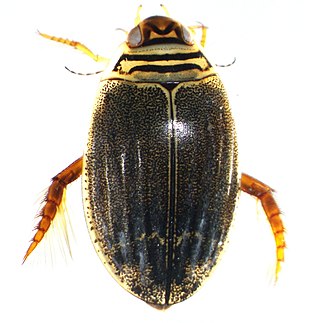Copelatus ilybioides is a species of predaceous diving beetle in the family Dytiscidae. It is found in Africa.
Sanfilippodytes compertus is a species of predaceous diving beetles in the family Dytiscidae. It is found in North America.
Hydroporus melsheimeri is a species of predaceous diving beetle in the family Dytiscidae. It is found in North America.
Heterosternuta wickhami, the hydroporus diving beetle, is a species of predaceous diving beetle in the family Dytiscidae. It is found in North America.
Agabinus is a genus of predaceous diving beetles in the family Dytiscidae. There are at least two described species in Agabinus. They are found in North America.
Neoporus spurius is a species of predaceous diving beetle in the family Dytiscidae. It is found in North America.

Cybistrini is a tribe of predaceous diving beetles in the family Dytiscidae. There are 12 genera and 130 described extant species in Cybistrini. The same set is also called Cybistrinae by authors viewing it as a subfamily of Dytiscidae.
Agabus punctulatus is a species of predaceous diving beetle in the family Dytiscidae. It is found in North America.

Acilius semisulcatus is a species of predaceous diving beetle in the family Dytiscidae. It is found in North America.
Hydroporus striola is a species of predaceous diving beetle in the family Dytiscidae. It is found in North America and the Palearctic.
Desmopachria mexicana is a species of predaceous diving beetle in the family Dytiscidae. It is found in North America and the Neotropics.
Coptotomus interrogatus is a species of predaceous diving beetle in the family Dytiscidae. It is found in North America and the Neotropics.
Rhantus consimilis is a species of predaceous diving beetle in the family Dytiscidae. It is found in North America.
Liodessus obscurellus is a species of predaceous diving beetle in the family Dytiscidae. It is found in North America and the Neotropics.

Sanfilippodytes pseudovilis is a species of predaceous diving beetle in the family Dytiscidae. It is found in North America.
Ilybius vancouverensis is a species of predaceous diving beetle in the family Dytiscidae. It is found in North America.
Sanfilippodytes edwardsi is a species of predaceous diving beetle in the family Dytiscidae. It's found in North America.
Hydroporus columbianus is a species of predaceous diving beetle in the family Dytiscidae. It is found in North America.
Sanfilippodytes brumalis is a species of predaceous diving beetle in the family Dytiscidae. It is found in North America.
Sanfilippodytes terminalis is a species of predaceous diving beetle in the family Dytiscidae. It is found in North America.


